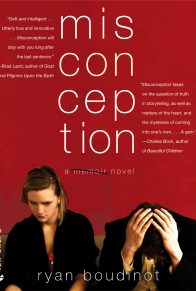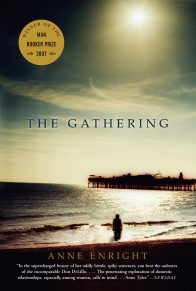Helen O’Mara is widowed at age thirty when her husband, Cal, is killed in an oil rig disaster off the coast of Newfoundland. She is the mother of three young children, Johnny, nine, Cathy, eight, and Lulu, seven; and is pregnant with her fourth, Gabrielle. Lisa Moore uses the real life tragedy of the sinking of the Ocean Ranger on Valentine’s Day, 1982, to construct a story of devastating grief, loneliness, and ultimately, survival.
1. The story begins in 2008 and quickly flashes back to 1982. How is Helen’s temperament depicted in these first pages? What has happened to Helen in twenty-six years? Do you sense changes, or does she seem almost the same?
2. “Everybody had some kind of dream the night the rig went down” (p. 8). What role do dreams play in the story? Is Helen a dreamer? Is Helen pragmatic?
3. Helen feels “outside;” she feels “banished.” “It was an elaborate piece of theatre, this lying about the true state of where she was: outside” (p. 14). Does Helen “lie” to her children? Does she lie to herself? Does she cope? How?
4. “But John had got some girl pregnant. There was going to be a child. Two months after the Ocean Ranger sank, Helen’s mother-in-law had told Helen she’d had the dream again about the baby in the tree. It was the same dream Meg had when the rig went down. I think you’re pregnant, Meg told her. And Helen realized her mother-in-law was right” (p. 35). Moore moves seamlessly from 1982 to 2008. What does she reveal by linking these two pregnancies that occur so many years apart? What is similar and what is different about them? What emotional response does Helen have?
5. In the next chapter Moore makes twenty-six years pass seamlessly from one sentence to the next; “Come see your little sister, his mother had said. They’re calling my flight, John said now. I’ve got to go. Now, listen, John, his mother said. Are you listening? I’m listening, Mother, he said. He said Mother with a brittle irony” (p .41). How does John relate to Helen? How are Helen and John connected?
6. “My girls are unscarred, Helen thinks. My girls are frugal and shrewd, but they know how to have fun. When her girls were young, Helen had an idea she wanted them to be free of guilt. It was not an idea she had been able to put into words. But it was what she had wanted for her girls” (p. 141). Discuss how Helen treats John differently from his sisters. Is John an “outsider”? How has Helen’s attitude toward her daughters influenced Cathy and Lulu? Is Gabrielle different because she was born after her father’s death?
7. Cal’s father, Dave O’Mara, identifies his son’s body and tells Helen that she shouldn’t see him. Her reactions are very visceral. Find some examples of how she thinks about Cal before and after the accident. Why, in the end, does she decide not to view the body?
8. “She sleeps and sometimes she dreams him, and it is wrenching to wake up. There is no talk in these dreams, no actual words in these dreams, but she knows what he wants; he wants her to follow him” (p. 68). What about the accident continues to torment Helen? Does Helen live in the past? Does she really want to die to be with Cal?
9. What is the significance of Meg’s baptism of baby Gabrielle? Why doesn’t Helen intervene?
10. Throughout the story there are references to sparks, electricity, and fire. What do these various allusions represent? What kinds of accidents occur in the story? Can accidents be avoided? Is the broken mirror on her honeymoon really an omen to Helen?
11. The author describes some details about Jane Downey’s background, her interest in anthropology, her parents, and her life before meeting John. Why is it striking that they met in and spent a week together in Iceland? In what ways are John and Jane similar and in what ways are they different? Do you think that they are compatible? Discuss Jane’s reaction to her pregnancy as opposed to John’s. How would you compare their relationship to Helen and Cal’s?
12. “The school counselor, it seemed, had wanted John to know he was right to be afraid. There were very real things in the world to be afraid of. He had taught John some lucid dreaming techniques. These will help you cope, he’d said” (p. 94). Can John control his dreams? Can he control his fears? Does lucid dreaming help him?
13. “Everybody knows wallabies are herbivores, the little girl said. And then: What’s an abortion? John had assumed she didn’t speak English” (p. 34). In what ways does John seem clueless in Tasmania? How does his encounter with the little Japanese girl stick with him?
14. What part does Helen’s sister, Louise play? Why does she want Helen to renovate her house? “I’d open this place up, she said. It’s too goddamn dark in here. And now there are two ragged gaping holes on either side of the fireplace where the bookshelves had been” (p. 114). Is Louise helpful to Helen? Describe their relationship. Why does Helen seem ambivalent about renovating?
15. “Helen had seen that his work was in demand. You won’t be available, she asked. I’m pretty steady on, Barry said, up until June. Then I can’t be had for love nor money. He winked at her” (p. 147). How would you describe Barry? How does Helen see him? How does her experience with online dating affect her? Has her notion of a relationship changed since Cal’s death? Have her objectives altered with age?
16. Helen recalls all that happened in her house on the night of the accident. All her senses seem to have been especially acute. “She had known he was dead” (p. 161). Do you think that crises make us more attentive? Why is she so obsessed with knowing the exact details of what happened on the rig before it went down? Do you think that knowledge brings comfort? Do you think that Helen can ever know the truth?
17. “I can’t do this, Helen said. You were drifting into the other lane. I’m too old. You can’t drift. You have no bloody idea, Helen said” (p. 213). Helen’s driving lesson is tragicomic. Why does she learn to drive? Why does she take her daughter’s suggestion to take yoga? What does she experience at yoga? Do you think that she is about to “go forward”? What is happening to Helen?
18. “John has avoided being a father all his adult life. It has taken stealth and some underhandedness” (p. 238). Compare John to his sister, Cathy, who had a child when she was fifteen. What makes Cathy so impetuous? Is John really a cautious person? Is he really thoughtful? Which of Helen’s children is most like her?
19. “But she and Barry are not too old for carpentry, for making a living, for sewing dresses, for snowstorms and night sweats and threats from the bank and children and crying grandchildren. They are called upon. They are expected to participate. Maybe it should be over but it is not over. It is not over” (p. 243). What is Helen beginning to realize about Barry? What is she realizing about herself? What is the nature of time in this story? How does it affect everyone, but most especially, Helen?
20. “What is the world after all? What are sunlight and love and the birth of a child and all the small passions that break out and flare and matter so very much?” (p. 299). What is the importance of the eclipse on Helen and Barry’s honeymoon? Does it say more about the past or the future?
Suggestions for Further Reading:
Alligator by Lisa Moore; The Blind Assassin by Margaret Atwood; The Shipping News by Annie Proulx; The Year of Magical Thinking by Joan Didion; The Stone Angel by Margaret Laurence; Voyage of the Narwhal by Andrea Barrett; Hateship, Friendship, Courtship, Loveship, Marriage: Stories by Alice Munro; The Bird Artist by Howard Norman













